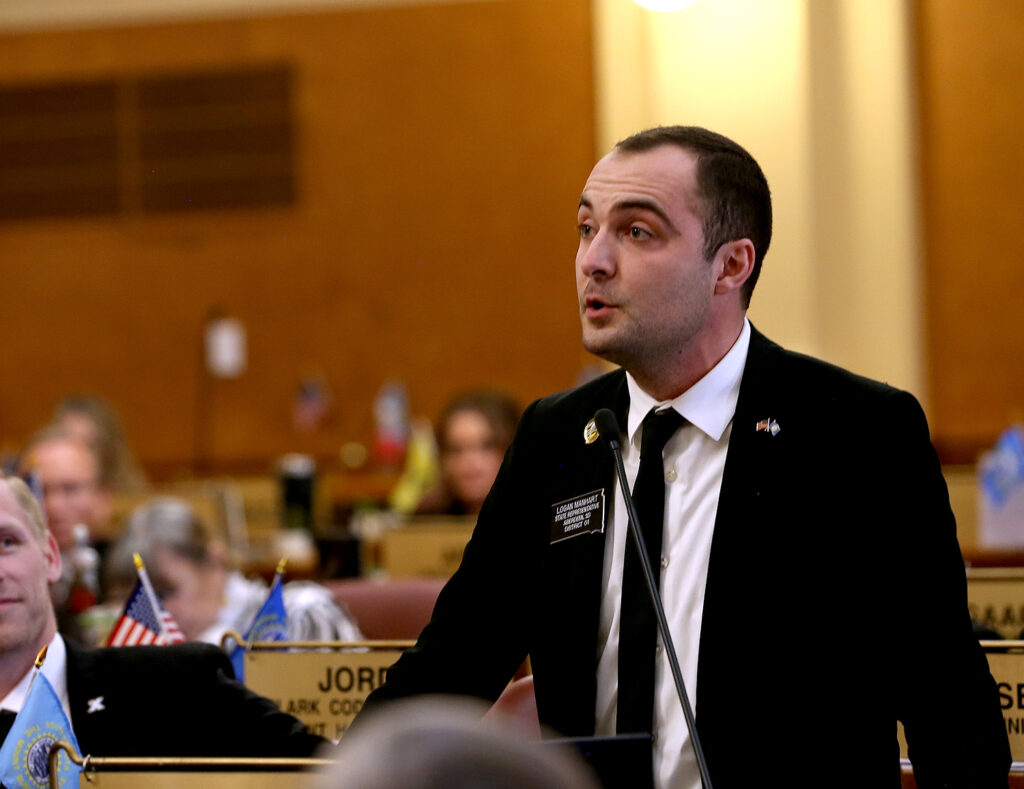
Rep. Logan Manhart, R-Aberdeen, speaks in the South Dakota House of Representatives on Feb. 21, 2025, at the state Capitol in Pierre. (John Hult/South Dakota Searchlight)
Usually South Dakota has its political controversies during the legislative session or an election campaign. This year, in the dead of summer, we have a state representative’s use of the term “White Boy Summer.”
It was used in an Instagram post by Rep. Logan Manhart, a District 1 Republican from Aberdeen: “It’s White Boy Summer and the boys are back in charge.” He wrote that, along with “#MAGA.”
I don’t use Instagram or hashtags. It seems to me that Instagram and some other social media sites are places online where people post things that they later come to regret. Manhart has since removed the Instagram post.
My ignorance of Instagram and hashtags aside, there are some things that I do know. In this day and age, I know that using the phrase “White Boy” is just asking for trouble. It’s particularly troublesome if it’s a phrase used by a state representative. It’s even more troublesome if it’s used by a representative whose district includes the Lake Traverse Indian Reservation.
Republican South Dakota lawmaker removes ‘white boy summer’ social media post after criticism
I’ve come to learn that the phrase is part of a rap song by Chet Hanks. (Tom Hanks’ son is a rapper?) It was written as a parody of a song called “Hot Girl Summer” by rapper Megan Thee Stallion. (I need to get out more.)
Apparently the song by Hanks has been appropriated by various racist extremist groups. (Those groups have theme songs now?)
The song’s popularity with extremist groups was enough to get Democratic members of the House involved. It’s easy to get them incensed as there are so few of them. Five members signed a letter to House Majority Leader Scott Odenbach and House Speaker Jon Hansen asking them to “address this with the seriousness it demands.”
In their letter they said Manhart’s post was racist, sexist and insulting to Native Americans. Democrats noted that the state’s Native American land was “taken through broken treaties, displacement, and violence.”
Odenbach, a Republican, said he wouldn’t punish Manhart, and he rejected the “insinuation that South Dakota is a state founded by racist oppressors, or that the great citizens of today are the cause” of continued harm to Native Americans.
To a certain extent, Odenbach is right. Today’s South Dakotans didn’t break any treaties, they didn’t lead any raiding parties, they didn’t push Native Americans on to reservations. But someone did. Odenbach’s notion that our forefathers were squeaky clean in this regard is a whitewashing of South Dakota history.
There’s plenty of blame to go around for the way Native Americans are treated in this state, and it’s Odenbach and his political party that must shoulder some of that blame. The South Dakota Legislature, dominated by Republicans, pays woefully little attention to Native American issues, preferring to think of those as federal rather than state problems. This amounts to the Legislature, sworn to serve all South Dakotans, turning its back on a group because of their heritage.
Americans have the First Amendment, so Manhart can say what he wants. It’s impossible to know what’s in his heart. Even though he has been unrepentant, he said characterizations of him as racist, sexist and antisemitic are false.
Like all political controversies, this one will peter out after a while. When the dust settles, Manhart will still be a representative. Democrats will continue to monitor his public statements. Republicans will maintain that everything in South Dakota is fine. And Native Americans will continue to be largely ignored by the state government sworn to serve them.
New commentary, free to your inbox: Sign up for our newsletter.


